2021 Update: Seizing Opportunities, Sparking Transformation
A MESSAGE FROM OUR CO-CEOs
What a year. 2021 began with a violent insurrection at the U.S. Capitol, putting threats to our democracy into sharp focus. There have been bright spots: a new administration willing to tackle big problems, trillions spent to help people in tangible ways, the deplatforming of Donald Trump and other white supremacists using online platforms to spread hate and lies. And there have been darker days as we’ve struggled to end the pandemic, live through the climate crisis, and reckon with the legacy and reality of racism in this country.
We’re proud of what Free Press has been able to accomplish at this challenging moment. And we have ambitious plans for the months ahead.
Building on our recent wins that secured more than $70 billion for affordable broadband access, we’ll be campaigning to truly close the digital divide once and for all. When the full Federal Communications Commission is finally in place, we’ll be pushing to restore real Net Neutrality and the essential Title II protections that make the best parts of the internet possible. We’re shaping congressional and state proposals to address the local-news crisis. And we’re advocating for policy solutions — and corporate accountability — to curb the spread of online hate and disinformation. We’re also sparking new debate in Congress, at the FCC and beyond about how to reckon with and repair systemic racism in the media. And our team is growing to meet both the opportunities and the challenges that lie ahead.
Our donors and activists make all of Free Press’ success and future plans possible — and we couldn’t be more grateful. And because we’re funded solely by independent charitable foundations and gifts from individuals, we’ll rely on your continued support and generosity to fuel our work in the months ahead. Read on to learn what you’ve helped accomplish so far this year.
In solidarity,
Craig Aaron and Jessica J. González
Co-CEOs
Free Press and Free Press Action
CLOSING THE DIGITAL DIVIDE
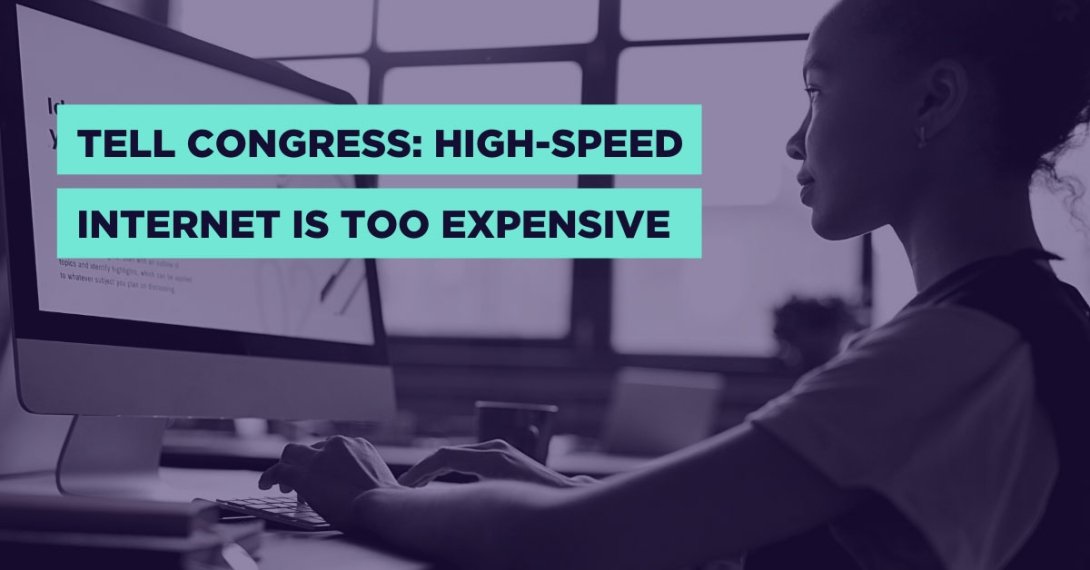
The pandemic has made it all too clear that affordable and reliable broadband access is a basic necessity, one that far too many people live without. Our advocacy paved the way for historic broadband provisions in the Senate’s newest infrastructure package. Never before have we seen such a meaningful congressional investment in closing the digital divide: The bill includes nearly $65 billion for broadband. A remarkable $14.2 billion of that total is committed to broadband-affordability measures.
This is a huge milestone — and we’ll work hard to ensure that this money gets to the people who need it most.
This achievement builds on work we’ve done since the start of the pandemic to make high-speed internet access more affordable for struggling households. 77 million people in the United States lack access to adequate high-speed internet — and this digital divide disproportionately impacts Black, Latinx and Indigenous communities. The divide has had severe consequences during the pandemic, where access to health care, schooling, work and so much more has depended on a reliable connection.

Flickr user WOCinTech Chat
In response to our advocacy and research, Congress included $7 billion for broadband in last December’s COVID-19 relief package — with nearly half specifically devoted to affordability measures to get and keep people online.
This year the Biden FCC set up the Emergency Broadband Benefit program to distribute this money, which provides a direct subsidy of up to $50 per month for eligible households to put toward their internet bills. For people living on Tribal lands, the monthly benefit is $75. Free Press monitored and shaped the implementation of this vital program — which will become a more permanent benefit when the infrastructure package becomes law.
Vice President of Policy and General Counsel Matt Wood testified in Congress about the need to treat broadband as an essential utility, noting “Those who lack home internet are often unable to safely social distance and are forced to put their entire families at risk to take care of basic human needs.”
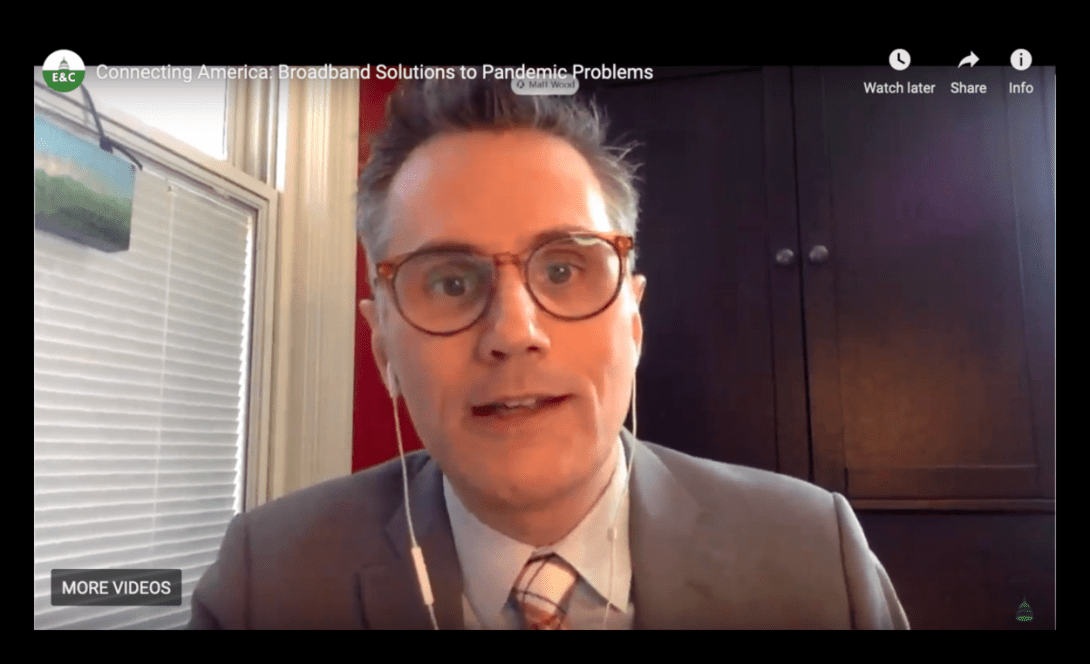
Free Press Action VP Matt Wood testified about the need to treat broadband as an essential utility.
We’re also fighting on other fronts to preserve access to broadband. Associate Director of Broadband Policy Dana Floberg has played an integral role in the Utility Justice Coalition, a network of more than 800 public-interest groups that is urging Congress and the president to prohibit companies from shutting off essential services like water, electricity and internet service during the pandemic. The coalition is also calling on lawmakers to use the infrastructure package to cancel utility debt, which amounts to billions of dollars nationally.
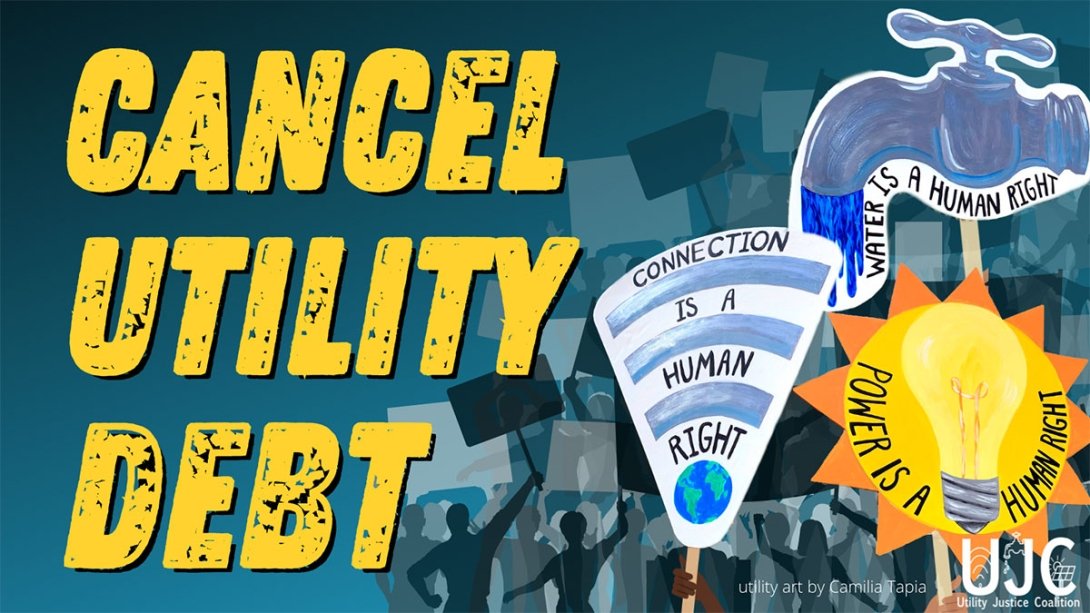
Meanwhile, Research Director S. Derek Turner’s investigation exposed billions of dollars of waste in the Rural Digital Opportunity Fund under the Trump FCC. This money, which is supposed to subsidize broadband for people living in rural communities, instead went to densely populated urban areas and to places that don’t need broadband like storage tanks and traffic medians. Our work helped push the Biden FCC to scrutinize this funding and take steps to ensure that this money brings internet service to real people.
We’ve also achieved some key victories in the fight to restore Net Neutrality. Last year, Free Press Action filed a brief in support of California’s landmark Net Neutrality law — and in February, a California federal district court rejected the efforts of cable and phone lobbyists to block the state’s enforcement of this law. And in July, President Biden issued an executive order calling on the FCC to bring back the Title II open-internet rules and promote broadband competition.
We’re pushing President Biden to appoint a fifth commissioner to the FCC so the agency actually has the power it needs to bring back the Net Neutrality rules and fully function on all other fronts. We’re urging the administration to take action and are working to shape the FCC’s agenda on key priorities, including reinstating Title II authority, protecting against ISP abuses — and regulating internet access as the utility it is.
FIGHTING HATE AND DISINFORMATION
The deadly attack on the U.S. Capitol in January was a painful reminder of what happens when companies like Facebook, Twitter and YouTube fail to act against people who use these platforms to incite violence and spread hate, conspiracy theories and disinformation.
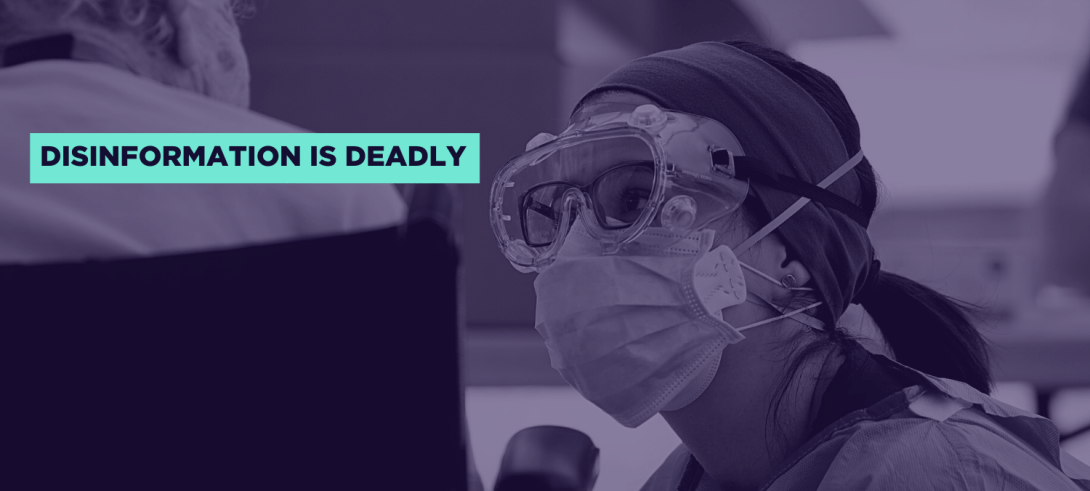
Long before the Jan. 6 insurrection, Free Press pushed social-media companies to use our research and ideas to combat hate and disinformation. We helped lead the Stop Hate for Profit ad boycott, the most successful public-pressure campaign against Facebook to date, and we co-founded Change the Terms, a coalition that calls on the platforms to adopt model policies we developed to crack down on hateful content. Co-CEO Jessica J. González — one of the nation’s most prominent social-media critics — has helmed this crucial work.
Our efforts have yielded numerous concrete changes. After years of pressure from Free Press and our allies, Twitter finally banned Trump, who fueled the insurrection and had long used his account to target people of color, immigrants, religious minorities and other communities. The company also removed 70,000 QAnon and conspiracy accounts and kicked off 3,000 white supremacists.
Facebook initially suspended Trump “indefinitely” and later changed his suspension to a two-year ban. We’re now pushing the company to permanently ban Trump and to close a loophole that’s allowing a Trump PAC to fundraise and organize on his behalf.
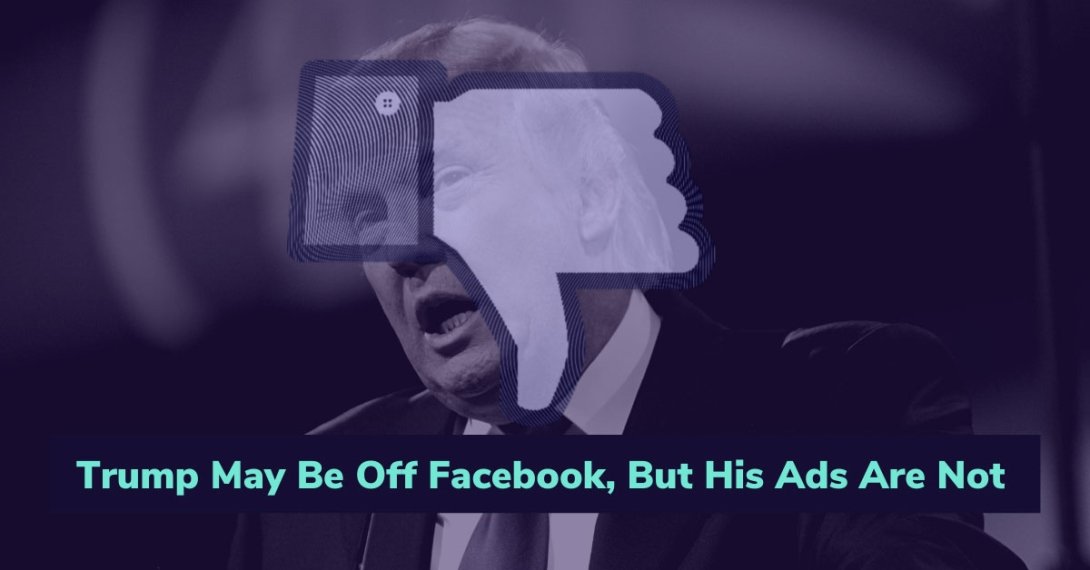
Following the insurrection, we were involved in direct talks that pushed Google and Amazon to boot the dangerous right-wing app Parler for promoting election lies. We also helped push Discord, Instagram, Reddit, Shopify, Snapchat, Spotify, TikTok and Twitch to either suspend Trump or restrict his access.
This is major progress, but social-media platforms must do much more to crack down on hate and disinformation. And these problems are even worse in languages other than English.
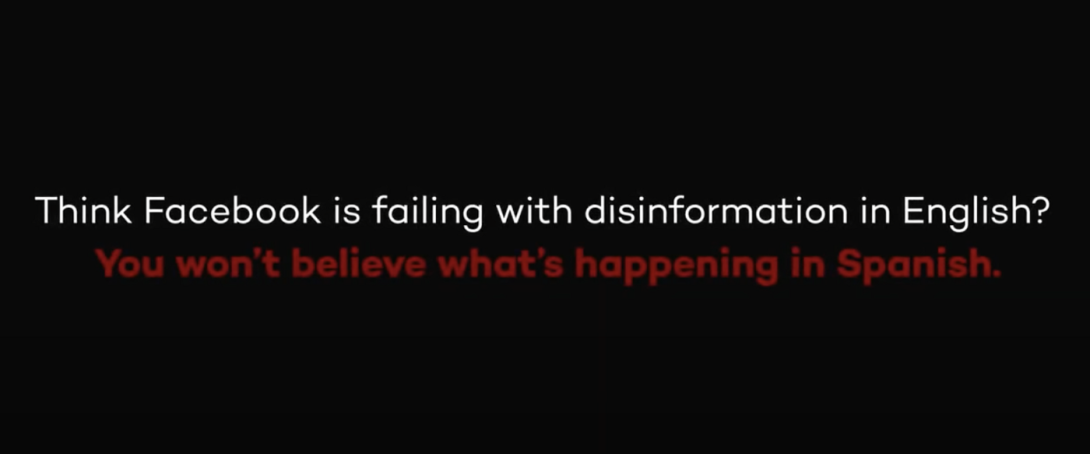
On Facebook, Spanish-language disinformation about the election, the pandemic, vaccines, climate change and other crucial issues runs rampant.
“Facebook is leaving out the millions of people who speak Spanish at home by failing to apply its community standards equally,” Associate Legal Director and Senior Counsel Carmen Scurato told The Guardian. “If you say you are making efforts on your platform for the safety and health of all of us, that has to also include the Latinx community.”
The company has long ignored our demands that it address this crisis. That’s why in March we launched #YaBastaFacebook (enough already, Facebook) — a campaign urging Facebook to fix its Spanish-language content-moderation gap. We released a detailed action plan that calls on the company to implement four key reforms, including hiring an executive to oversee U.S. Spanish-language content-moderation policy and enforcement.
We also worked with a producer to help shape a segment on Last Week Tonight with John Oliver on non-English misinformation. The story, which aired in October, highlights how social-media companies and instant-messaging apps have ignored non-English misinformation that clearly violates platform rules.
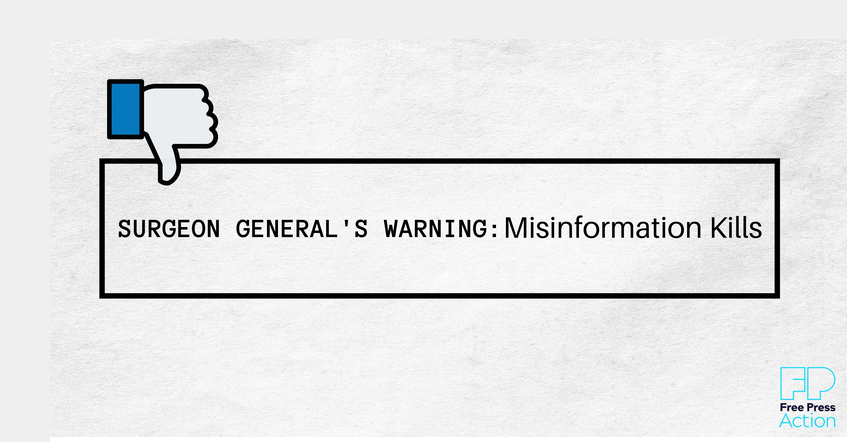
Meanwhile, in July U.S. Surgeon General Vivek Murthy released a report confirming the health threats of online misinformation. These lies have led people to refuse COVID-19 vaccines, reject masks and use unproven treatments for the virus. The report underscores the role social-media companies play in promoting misinformation and endangering lives: Like Big Tobacco companies, tech platforms continually put profits over the health and safety of their users. We’re calling on Congress to heed the warnings in Murthy’s report and hold the platforms accountable.
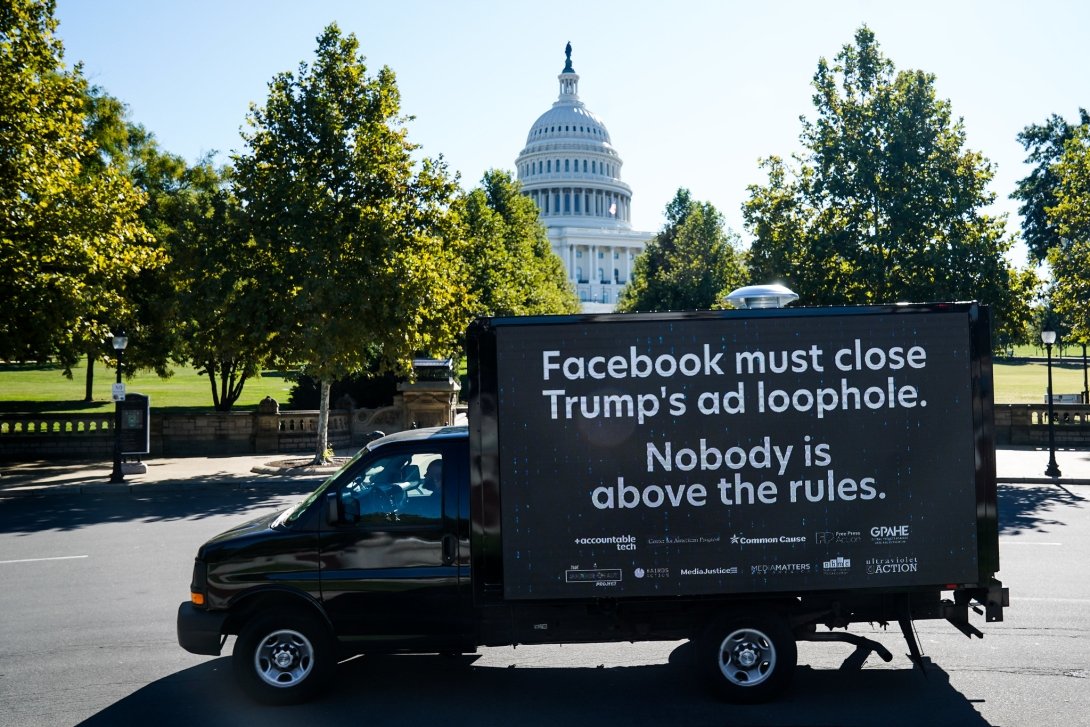
Chris Cruz 8 Media Group
In September, a mobile billboard demanding that Facebook ban ads from Trump’s PAC in accordance with its suspension of Trump’s accounts circled the company’s D.C. headquarters and Capitol Hill. We organized this action alongside Common Cause and delivered 140,000 petition signatures to CEO Mark Zuckerberg and COO Sheryl Sandberg.
Just a few days later, a whistleblower who previously worked as a Facebook data scientist released tens of thousands of pages offering hard proof that the company cares far more about its profits than the safety of its users. The documents show that the company is aware that Facebook-owned Instagram damages the mental health of teenage girls; that an algorithm it introduced in 2018 promotes harmful content; that it exempts high-profile users from some or all of its rules; and that it takes action on less than 1 percent of violent or inciting content.
The whistleblower’s powerful testimony before the Senate also confirmed what we’ve long known: The company does very little to moderate languages other than English. “There is a very racist element to the lack of investment,” Co-CEO Jessica J. González told Democracy Now!
We’re urging Congress and the Biden administration to regulate the company and adopt our policy solutions, which include federal privacy legislation, rules against abusive data-collection practices, and a tax on online advertising that would support noncommercial journalism. Facebook has survived scandal after scandal, and we are committed to doing everything we can to ensure that policymakers finally take action and stop the company from undermining democracy and harming millions of users around the globe.
We also worked with Sen. Ed Markey and Rep. Doris Matsui to help shape the Algorithmic Justice and Online Platform Transparency Act. This bill would prevent social-media companies from using algorithms to discriminate in hiring, housing, lending and other areas of opportunity. It would also compel the federal government to develop and update regulations around unfair and deceptive advertising practices by technology platforms. We’re meeting with congressional offices to build support for this important legislation.
ORGANIZING FOR MEDIA REPARATIONS
Last fall, the Black staff at Free Press — led by Media 2070 Director Alicia Bell, Senior Director of Strategy and Engagement Joseph Torres and Vice President of Cultural Strategy Collette Watson — launched the groundbreaking Media 2070 project, which seeks to create a future in which Black people control the creation, production and distribution of their own stories. The centerpiece of the project is Media 2070: An Invitation to Dream Up Media Reparations, a visionary 100-page essay examining the history of anti-Black racism in the U.S. media system.
In 2021, this work has continued with a series of powerful online gatherings about the fight to secure media reparations and build an equitable media system. Events have included a month-long celebration of Black narrative power; a commemoration of the 100th anniversary of the Tulsa Race Massacre with Black journalists and activists in Oklahoma; and a conversation between Torres and MediaJustice founder Malkia Devich-Cyril — moderated by MediaJustice Executive Director Steven Renderos — about how the media system fuels anti-Black oppression.
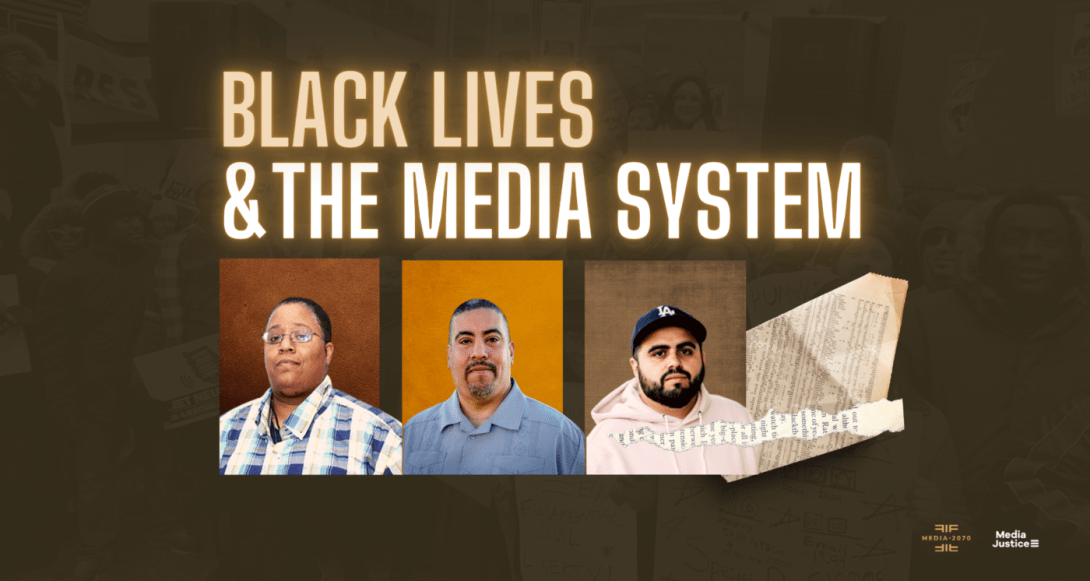
In June, Media 2070 delivered a petition to 3,000 newsrooms across the country that calls on outlets to dismantle anti-Black racism, trust Black journalists and care for Black communities. So far 40 journalism organizations — including CUNY’s Craig Newmark Graduate School of Journalism, Scalawag Magazine, the Tucson Sentinel and WURD Radio — have signed the pledge.
Our work spurred 25 members of Congress — led by Reps. Jamaal Bowman, Yvette Clarke and Brenda Lawrence — to send a letter urging the FCC to investigate how its policy choices and actions have harmed Black people and other communities of color. Media 2070 also mobilized more than 100 organizations and community leaders to join this call to the agency.
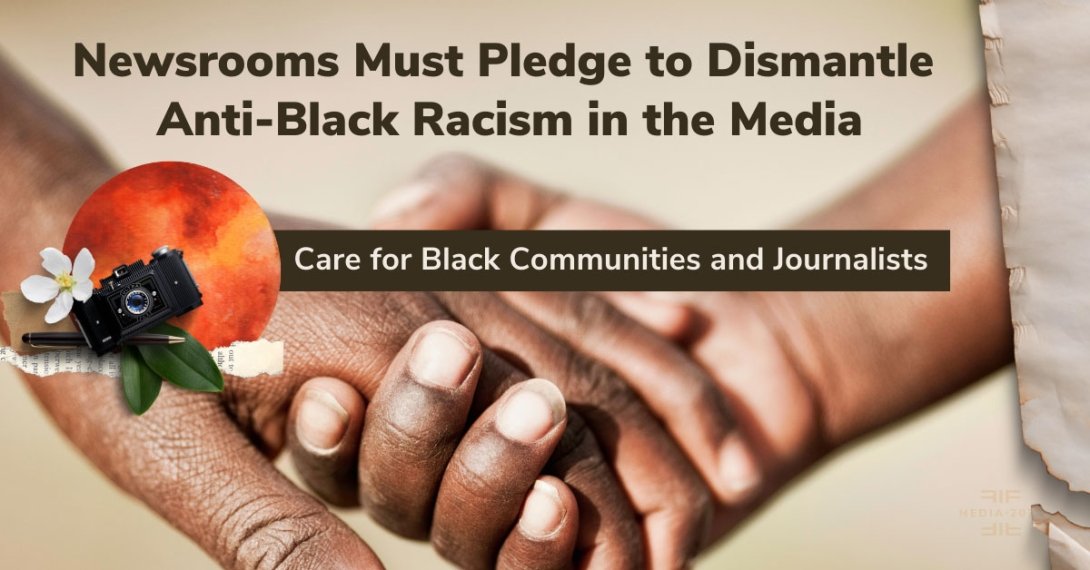
Acting FCC Chairwoman Jessica Rosenworcel issued a statement in response: “I recognize we can’t build a better, more equitable future without a reckoning of how our past continues to influence our present and how too many communities continue to be overlooked and underserved,” she said.
TRANSFORMING LOCAL NEWS
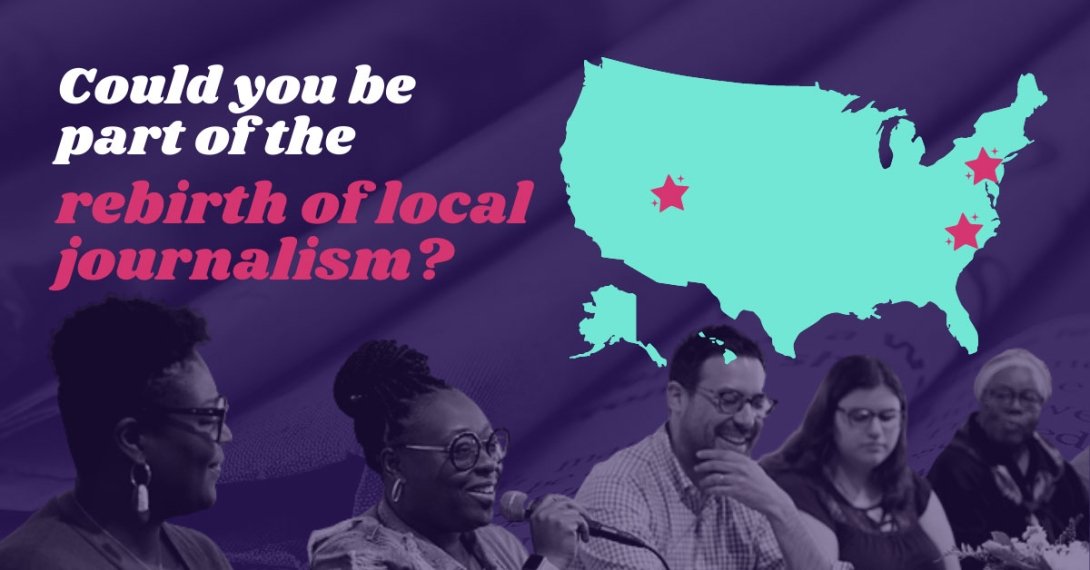
Civic Info Consortium: Five years ago, Free Press Action came up with the concept of a publicly funded nonprofit that would support local news in New Jersey. Thanks to the leadership of Senior Director of Journalism Policy Mike Rispoli, we turned that idea into legislation, built bipartisan support, passed the bill by an overwhelming majority in the statehouse — and the New Jersey Civic Info Consortium was born.
In 2020, New Jersey announced it would invest $500,000 in the consortium — and this June the consortium’s board (which includes Rispoli) announced its inaugural round of grants to local news-and-information initiatives. This milestone was the result of Free Press Action’s years-long efforts to engage local journalists, organizers, advocates, residents and lawmakers to support public funding to foster more informed communities.
The 14 grantees, which received grants of up to $35,000 each, will undertake projects to keep communities informed, spark civic engagement and counteract the spread of disinformation and bigotry. More good news came later in June, when the state doubled its commitment to the consortium with a $1-million investment in the FY2022 budget.
News Voices: New Jersey: Under the leadership of News Voices Director Vanessa Maria Graber, we’re working with community members and journalists in Atlantic City, Camden and Newark to facilitate equitable access to information.
This work is taking many forms. We completed a project with Chalkbeat and the Newark News & Story Collaborative that highlighted youth information needs and experiences during the pandemic. We also created a collaborative training project for Latinx journalists that focuses on information needs and community engagement. And we launched two statewide collaboratives: One is a cohort of hyperlocal community-journalism projects and the other is an effort focused on visioning the future of journalism in New Jersey.
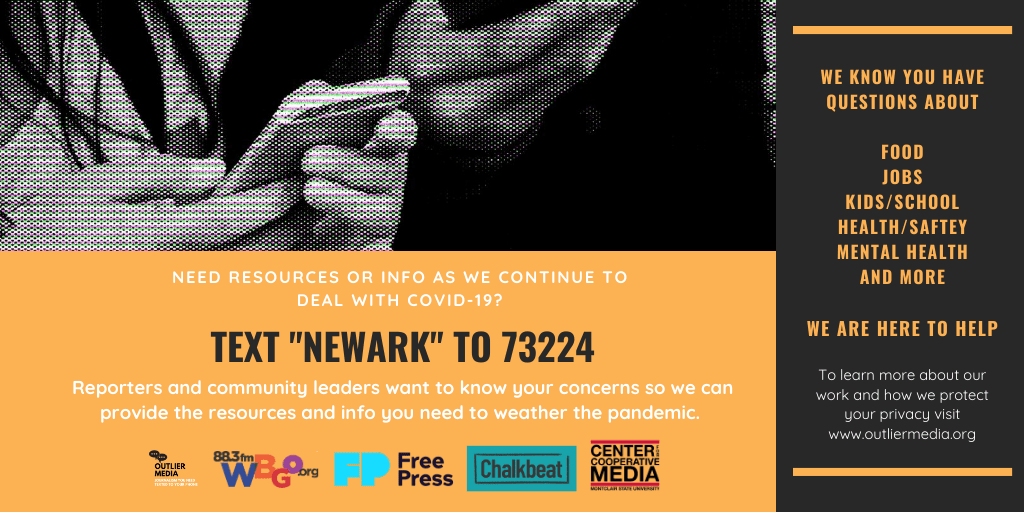
Outlier Media
News Voices: Philadelphia: Together with our partners on the Shift the Narrative Project, we’re working to transform coverage of the criminal-legal system in Philly. Much of that work has centered on The Philadelphia Inquirer. The paper’s failures came into focus in 2020 when it published an article with the racist headline “Buildings Matter, Too.” The outrage that greeted this headline prompted the paper to kick off a self-assessment, and we’re playing a key role in this process: We’re helping the Inquirer examine its historically problematic coverage of public safety, policing and trauma and devise ways — like getting rid of crime briefs — to craft more equitable reporting.
We’re also continuing to build relationships with local activists and organize within newsrooms throughout the city to lay the foundation for significant change.
News Voices: Colorado is working to train newsrooms on engaging BIPOC communities. News Voices: Colorado Manager Diamond Hardiman convened the Black Voices: Colorado and Latinx Voices: Colorado working groups, which each focused on how to hold newsrooms accountable and improve access to trustworthy news and information. In September, the Black Voices working group held a series of events and released an in-depth report with recommendations on how to repair decades of harm news outlets have inflicted on Black communities. Later this fall the Latinx Voices working group will release its own report.
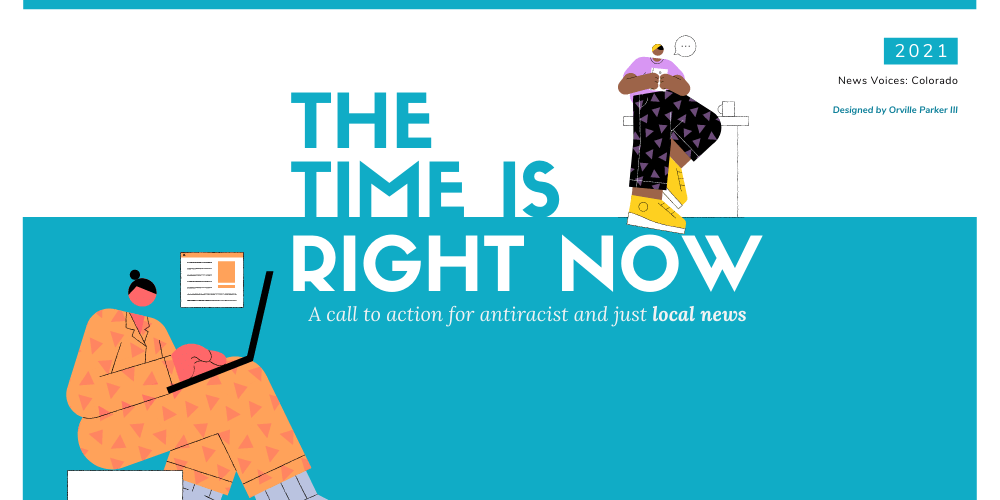
The Black Voices report features steps that newsrooms can take to serve and support Black communities.
News Voices: North Carolina is partnering with Black-led organizations such as Liberation Ventures, NC BLOC and NC Media Equity Project to convene local stakeholders, identify reparative interventions and boost access to equitable local news. In September, we facilitated a listening event with partners and journalists to get feedback from BIPOC residents on how to ensure news coverage represents the state’s diverse communities. Alicia Bell has led all of this work.
CRAFTING JOURNALISM POLICY
The pandemic has worsened a longstanding crisis that has left communities across the country without trustworthy local news. In 2020, we led the call for a journalism recovery, and this year we’re continuing that advocacy and helping to shape the debate over the future of journalism in Congress.
Our work is paying off: We’re seeing growing numbers of lawmakers introduce legislation in response to the local-news crisis. As analysis from Co-CEO Craig Aaron and Research Director Derek Turner shows, some of the bills would benefit existing media giants — the very same companies that have gutted local newsrooms, spread disinformation and profited from runaway media consolidation. We’re fighting for legislation that both addresses the current crisis and points toward a sustainable and just future. We’re urging lawmakers to double funding for public media, create civic-info funds in all 50 states and tax targeted online ads, with the proceeds supporting quality local news.
DEFENDING PRIVACY & COMBATING SURVEILLANCE
In 2020, we blocked reauthorization of the Patriot Act — and this year we’re continuing to fight any attempts to revive it.
We’re also pressuring congressional leadership to hold a hearing on the Fourth Amendment Is Not for Sale Act, which we helped shape. This bipartisan bill would close major loopholes in federal privacy laws and prevent government agencies from buying people’s personal information from data brokers without a warrant. The legislation is a much-needed response to repeated government abuses that have targeted immigrants, people of color and religious minorities.
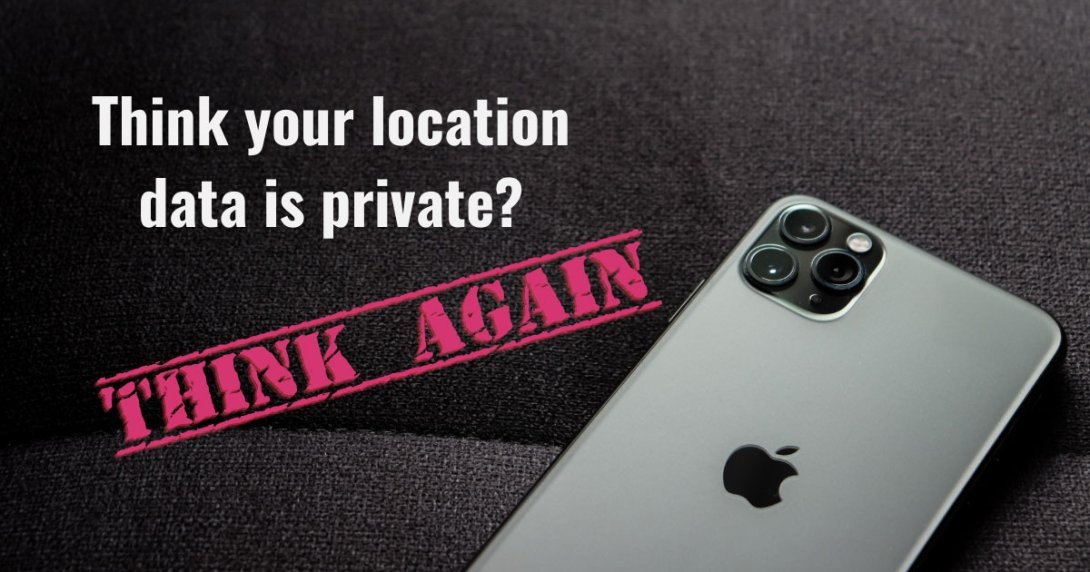
We’re also mobilizing support for the Facial Recognition and Biometric Technology Moratorium Act, which would ban police use of these discriminatory technologies. And in response to pressure from Free Press and allies, Amazon indefinitely extended its ban on selling such tech to police departments.
In February, we co-hosted a congressional briefing on surveillance alongside MediaJustice, the ACLU and Color Of Change that explored how government agencies have long exploited crises like the Jan. 6 insurrection to justify the use of surveillance technologies and policing tools that disproportionately harm Black and Brown communities. Director of Surveillance and Free Expression Policy Sandra Fulton was a panelist, and Rep. Rashida Tlaib was the featured speaker. Alongside this event, we delivered more than 100,000 petition signatures demanding that Congress end the FBI’s “Black Identity Extremist” designation and #ProtectBlackDissent by investigating FBI and police use of surveillance tech against communities of color.
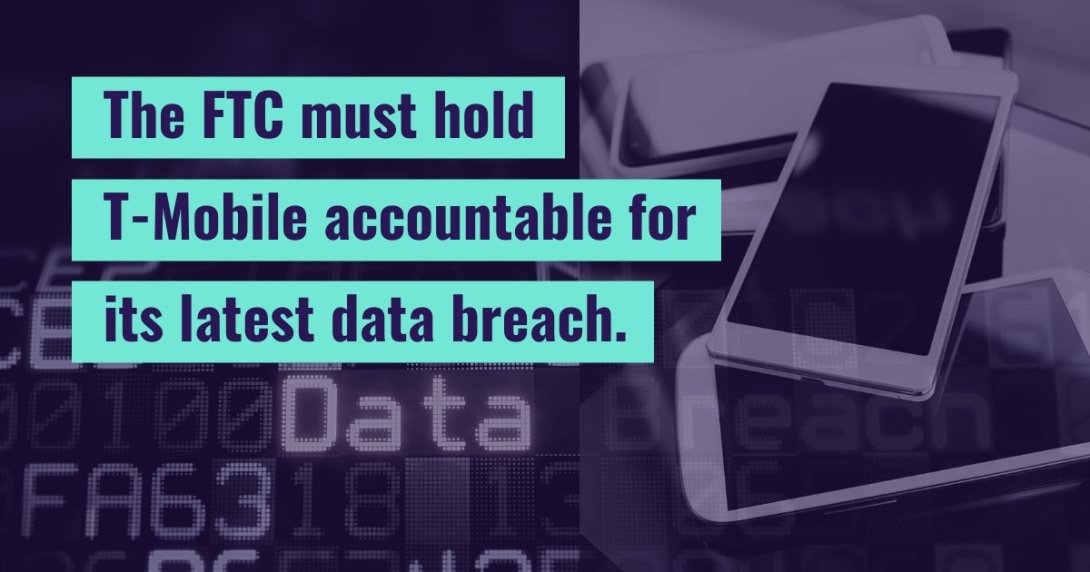
In September, we called on the Federal Trade Commission to penalize T-Mobile, which just experienced its fifth data breach in three years. This time, more than 50 million people — most of whom aren’t customers or never were — had their Social Security numbers, birthdates, drivers-license numbers and other sensitive information stolen. We’re calling for an official investigation into the harmful data-retention practices of U.S. corporations.
FIGHTING FOR RESILIENT NETWORKS
In response to our research and advocacy, last year Rep. Frank Pallone asked the Government Accountability Office to investigate the Trump FCC’s failure to adequately respond to the destruction of communications networks in Puerto Rico following Hurricanes Irma and Maria. This year the GAO released its report, which criticizes the Trump agency’s lack of transparency and its failure to engage with communities on the islands. We’re urging the Biden FCC to do what its predecessor refused to do: Launch an independent investigation into the roots of the protracted communications blackout.
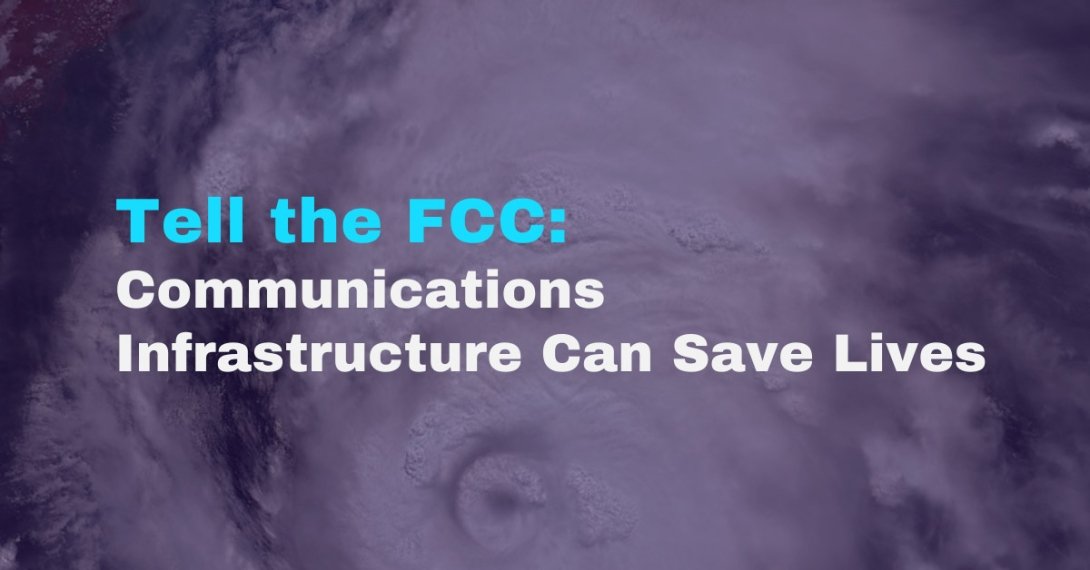
Our advocacy for resilient communications networks is taking on renewed urgency as the climate crisis intensifies. After Hurricane Ida left large swaths of Louisiana without reliable cellphone services and the region’s 911 call center lost power for 13 hours, we called on the FCC to ensure that communications infrastructures everywhere can withstand climate disasters.
GETTING THE WORD OUT
Our show Free Press Live features staff and guests in conversation with co-hosts Collette Watson and Vanessa Maria Graber (and guest host Dana Floberg) about topics ranging from the media’s coverage of anti-Asian hate to the fight to secure media reparations.
We’ve had 2,200 press hits so far this year in places including the Associated Press, Bloomberg, Democracy Now!, The Guardian, MSNBC, NPR, Poynter and Wired and have placed 20 Op-Eds.
To stay up to date on our work, you can follow Free Press on Facebook and Twitter.
FUND THE FIGHT
Your generosity makes our work possible: Please give what you can today to make sure we have the resources we need to keep fighting for equitable media policies that improve people’s lives.

You can support us by making a donation online or by mailing a check to P.O. Box 60238, Florence, MA 01062. You can also make a contribution through a donor-advised fund, a gift of stocks or securities, or a planned gift. For more information, please visit other ways to give or reach out to us.
Thank you!
Free Press and Free Press Action are nonpartisan organizations fighting for your rights to connect and communicate. Free Press and Free Press Action do not support or oppose any candidate for public office.
